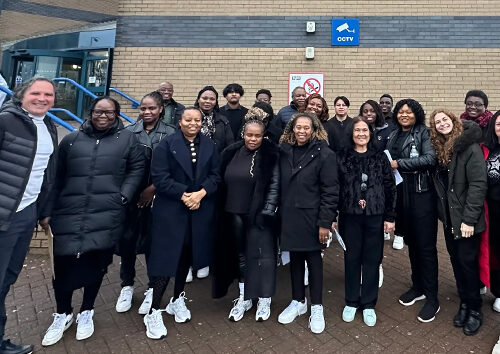20 December | St. Albans, England [Vanesa Pizzuto]
The summer sun was making its presence felt through the railway station glass ceiling. Sam, on his way to meet his wife after running several errands, looked up and smiled; a long morning was finally coming to an end! Walking mindlessly through the station, he noticed an elderly woman slowly making progress through the ocean of people. For a nanosecond, their gazes met. A polite Brit, Sam immediately looked away embarrassed.
Hungry, he headed to the station fast-food restaurant. As he ordered his lunch, he again saw the same lady at the next till. She ordered six chicken nuggets and a large portion of fries. “Four pounds and eighteen pence, please”, said the cashier smiling, but the lady only had two pounds. Looking around and recognising Sam, she asked for some coins. Sam stuck his hand in his pocket, but instead of coins, out of his pocket came what Sam thought was an old forgotten receipt – but amazingly it was a restaurant coupon! The beneficiary would get exactly six chicken nuggets and one portion of fries for only two pounds.
“It was fantastic to see God revealing himself through chicken nuggets,” Sam shared at church on sabbath. While I agreed, his story made me think not just about God’s provision, but about waiting… For how long was that coupon nothing but a useless piece of paper, forgotten and crumpled in a dark pocket?
On Waiting
Waiting is not for the fainthearted! It often causes us to grow in ways we wish we could avoid… Think about it: Abram was 75 years old when God promised to make him into a great nation (Gen. 12:1-4). After 25 years of waiting – Isaac was born, the child of promise (21:5) – a whole quarter of a century later! Joseph was roughly seventeen years old when his brothers sold him as a slave (37:2). Adding to the time he served Potiphar, and the time he spent in jail, he must have waited at least thirteen years before seeing his prophetic dreams come true (41:46). The people of Israel endured nearly four h-u-n-d-r-e-d years of slavery before God rescued them. And the list could go on and on… Have you ever stopped to consider what these heroes of faith must have felt while waiting?

And when we do consider their waiting, we still have a great advantage: we know how the story ends! We can turn the page, or scroll down and, in a matter of seconds, move from uncertainty to resolution. Years of tears, injustice and fear seem to be resolved in just a few verses. When it comes to our own stories, however, we don’t have that kind of advantage.
So, our waiting feels, understandably, much more vulnerable, and open ended. “The hardest thing about waiting is not knowing when it’s going to end, if it is going to end”, writes Betsy Childs Howard, author of Seasons of Waiting: Walking by Faith When Dreams are Delayed. “Waiting brings questions without easy answers. If your life’s plans aren’t coming to fruition, should you change course or hold out for your heart’s desire? Are your unfulfilled yearnings indicators of sinful discontentment or blessings God simply hasn’t yet fulfilled?”¹
Waiting is vulnerable. It exposes us. Like a receding tide revealing the riverbed, waiting leaves us with no place to hide. Our expectations, coping mechanisms (working and otherwise) and desire for control lay plainly visible, like fish flopping in the scorching sand. Waiting takes us back to childhood, when we were more aware of, or at least less able to hide, our utter dependence on others. And perhaps, even in its austerity and undeniable pain, this is the gift that waiting can offer us.
Grace for Slowness
Celebrating Advent means learning to wait well. It means willingly submitting to its discipline, trusting that, in the fullness of time, a deeper, more rooted Hope will be born in us. And when we do this, we don’t do it alone, we do it with Emmanuel, with the God who chose to share in our waiting.
“By becoming a baby Jesus automatically put God’s seal of approval on a slow process,” reflects pastor Daniel Duda president of the Trans-European Division. “In the incarnation the infinite being of God was somehow confined in the body of that tiny little baby. He who made the whole universe had to learn how to walk—He was able to go only as fast as his two little feet would carry Him.”
“Why would God do that? Why not send his Son as a grown man who went straight to the cross, or at least straight to his public ministry? Were the first 30 years completely wasted?”, Duda wonders. “No! The ‘becoming’ was as much part of his plan as was the ending. Grace for slowness is built into the very nature of the Incarnation. It teaches us that God understands. This is an important truth that is clearer to us humans because of the Incarnation: God is more patient with me, than I ever will be.”
So, no matter how dark the season, or how forgotten we may feel, the Advent reminds us that waiting is never wasted. The process is as important as the result (so important, in fact, that Emmanuel waits with us!). And in the fullness of time, like that crumpled coupon, we’ll discover the deep grace of God’s calling and timing.
“Wait for the Lord; be strong, and let your heart take courage; wait for the Lord!”
Psalm 27:14 NRSV.
¹Betsy Childs Howard (2016), Seasons of Waiting: Walking by Faith When Dreams Are Delayed, Crossway Books, Illinois, USA.
[Photos: Unsplash / Video: David Neal and James Botha]



